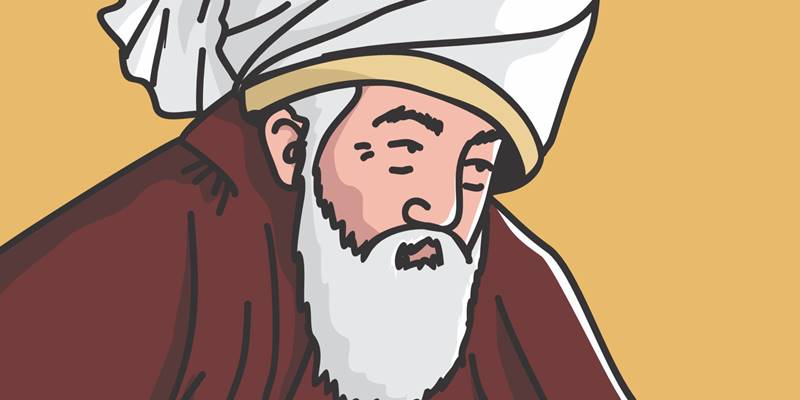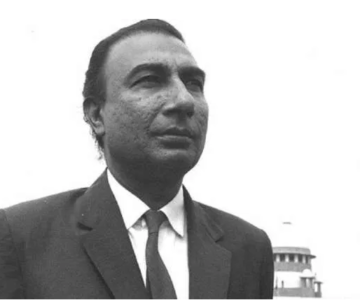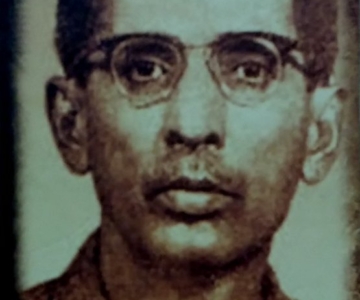Ecstasy and Order
– Mevelana Rumi –
The 30th of September this year marks the 800th birth anniversary of one of the greatest Sufi mystic poet of Islam, Mevelana Hazrat Jalaluddin Rumi.
In honor of Mevlana’s 800th birthday, UNESCO has declared 2007 to be the Year of Mevlana – a year of love and understanding.
The name Mevlana Jalaluddin Rumi stands for an ecstatic flight into the infinite love.Everything other than love for the most beautiful God
Though it be sugar- eating.
What is agony of the spirit?
To advance toward death without seizing
hold of the Water of Life.
– Rumi
Mevlana Jalal al-Din al-Rumi was born 6 Rabi’al-Awwal 604 (30 September 1207) in Balkh, a town in the north of Afghanistan.
His father and mother were well known for their comprehension (irfan) and scientific knowledge. His mother was Mu’mine Khatun, the daughter of Rukn al-Din, the Emir of Balkh. His lineage by his mother descended from Hazrat Ali, the fourth Caliph of Islam. His Father Baha al-Din Walad,was called the Sultan of Scholars Baha al-Din Walad decided to leave Balkh before the coming Mongol threat. Immediately after their leaving, Balkh was destroyed by the troops of Jenghiz Khan.
The journey, which started from Balkh while Mevlana was only five years of age, lasted years, and extends via Baghdad and Mecca to Damascus, Malatya, Erzincan, Akshehir and came to a halt in Larende (Karaman) in Turkey.Here Mevlana’s father continued his lectures in the madrasa of Karaman.
When Sultan Ala al-Din Keyqubat I learned that Baha al-Din Walad was in Karaman, he invited him to Konya, the capital of the Seljuks, Mevlana’s father died there on February 24, 1231.
A great scholar and Sufi Burhanuddin al Trimithi arrived in Konya ,Rumi studied under him and devoted himself to his service for nine years.
This training was focus on divine love , worship , austerity and abstinence , piety , consciousness of god , humility and tolerance which are the foundation of Sufism .
Rumi spent his days mostly praying and serving people who came to visit the sufi center preparing food for them , collecting wood for cooking, he thus learned the merits of serving people and knew that serving people is ultimately serving God.
The most famous and probably the most fruitful relationship in his development was with Shams-al-Din Tabrizi, whom he met in Konya at the suggestion of Ruknuddin Zarqubi. To this day the place where the two first met in Konya is known as Marc’al Bahreya. The meeting point of the two oceans. It was Hz. Shams al Din Tabrizi an enigmatic wandering dervish who brought about a major spiritual epiphany and opened Rumi’s heart to the Divine secrets .Through their spiritual cooperation, they enlightened those of their own age, and have also influenced all the centuries which followed.
Following the mysterious departure of Shams Tabiriz, Rumi’s grief was expressed in one of the greatest outpourings of longing and separation ever produced in any language: a great waterfall of Persian verses – some 3,500 odes, 2,000 quatrains, and a massive mystical epic. The Masnavi sharif , some 26000 couplets long ,a collections of tales ,teaching stories and spiritual Sufi anecdotes. It clearly stands as one of the greatest expression of mystical Islam .
Listen to the read as it tells its tale;
it complains of separation.
Since they cut me from the reed-bed,
Men and women have been crying over my lament.
– Rumi
Rumi advocated an individual interior spirituality, and it is the love, rather than the fear, of God that lies at the heart of his message.
Rumi also believed passionately in the use of Sama (music), Naat e sharif (poetry) and Raqs (dancing) as a path for reaching Allah ,as a way of ,as he puts it, opening the gates of paradise. For Rumi ,music helped devotees to focus their whole being on the Divine ,and to do this so intensely that the soul was both destroyed and resurrected. It was from these Sufi thoughts that the Mevlevi Sufi Order of the Whirling Dervishes came into being which became as one branch of the vast Sufi traditions of Islam.
The greeting of the Whirling Dervishes during the procession represents three stages of Knowledge – “Ilm al Yakin”, i.e. receive knowledge gained from others or through studies. “Ayn al Yakin”, i.e. knowing by seeing or observing for ones self. and “Haq al Yakin”, i.e. knowledge gained through direct experience – Gnosis or Marifat .
When Rumi passed away at a sunset of December 17th, 1273 A.D. Muslims, Christians, Jews, Arabs, Persians, Turks and Romans honored him at his funeral. That night was named as Sheb e Uru’s or the night of union with the Divine, ever since the Mevlevi Sufi Order marks this day as a Urs celebrations.
People from every religion joined in at Mevlana’s funeral, Muslim and non-Muslim. When a group of Muslims said to the non-Muslims: “What business do you have with this funeral? Mevlana was the leader of our religion.” They replied: “We realized the truth of Moses, Jesus and other prophets from Mevlana’s plain words and saw in him the actions and personalities of the prophets as we have read in our own Holy Books. Just as how you Muslims recognized him. Just as you loved him, we loved him too, and became slaves for him far more than you did.”
His tomb, which is also known as the Green Dome (Qubba-i Hadra), was built by the efforts of Sultan Walad and Ala al-Din Qaysar, and by the material support of the Seljuk Emir, and his Georgian wife Gurju Khatun. Its architect was Badr al-Din from Tabriz and was completed a year after Mevlana’s death.
Rumi utilized the Nay (reed flute) , Sama (music) ,Naat e sharif (lyrics and poetry) to call and collect people around his message. With the breath of the reed, flute and songs he would breath his own soul and understanding in the people in order to make them live in peace, harmony, respect, prosperity and eternal bliss here and in the here after, therefore there were very many people of other faiths around Rumi listening to him, respecting him for what he was teaching.
Today, we are experiencing rather similar disorders, unrests and conflicts everywhere.
Beliefs are being exploited and made a means and cause of conflicts in the so called clash of civilization. Therefore, now it is time to come together, talk, try to understand one another and to find common ground of references. This is what real civilization requires and demands from us today.
“Come, Come again!
Whatever you are…
Whether you are infidel,
idolater or fireworshipper.
You have broken your vows
of repentance a hundred times
this is not the gate of despair,
this is the gate of hope.
Come, come again…
– Mevlana Jelaluddin RUMI
By – Syed Salman Chishty – a humble Khadim (servant) of Hz.Khawaja Gharib Nawaz (ra). Ajmer sharif .



